I was reading The Wind in the Door by Madeleine L’Engle last night to the girls before bed. It had been a day full of irritability (mostly mine), covid tests, and thwarted plans. Maya, Stella, and I were snuggled up in bed, trying to let the recent tantrum and the day go, when I read these words:
“Meg, when have you been most you, the very most you?”
She closed her eyes. She remembered the first afternoon Calvin had come to the Murrys’. Calvin was an honor student, but he was far better with words than numbers, and Meg had helped him with a trigonometry problem. Since trig was not taught in Meg’s grade, her easy competence was one of their first surprises for Calvin. But at the time she had not thought of surprising him. She had concentrated wholly on Calvin, on what he was doing, and she felt wholly alive and herself.
“Think. You didn’t know Calvin very well then, did you?”
“No.”
“But you loved him, didn’t you?”
“Then? I wasn’t thinking about love. I was just thinking about trig.”
“Well, then,” Proginoskes said, as though that explained the entire nature of love.
The passage took my breath away. I asked Maya, a mature 7-years-old, “When do you feel the most you?”
She thought about it for a minute, then said, “When I’m listening to audio books and doing little projects in my room.”
Checks out.
“Stella, when do you feel the most you?”
She shrugged. She’s five. Maybe, it occurred to me, she’s always the most her, still. She’s blessedly ignorant about “impression management”--as the social psychologists call it. Still just one self, one unselfconscious impression, at all times.
Later I tried to think about the answer for myself. When am I the most me?
Writing, yes. Even when it goes badly, it feels wholesome. Reading, for sure. Perhaps an even more pure expression of what makes me feel most sacred and myself--to take in other stories, not pen my own.
But also there’s that social part of me, my mother’s daughter who gathers and drinks and laughs and always leaves at least an hour later than I thought I would. That’s the most me, too.
But there’s also the part of me, newer, that is most me when I am my daughters’ mother. Over the last eight years, I grew a new me. She’s very physical--a hand on little sweaty foreheads, a kiss on scraped elbows, someone to wrestle you when you need that or fly you like an airplane on outstretched legs when you need that. She’s also a provider--always has a watercolor set nearby, another bowl of pretzels, a question about your day or your dreams or your disappointment. So. Many. Questions.
There’s this other part of the passage: I wasn’t thinking about love. I was just thinking about trig.
I think what L’Engle is saying is that we are ourselves most fully and exquisitely when we aren’t trying to be. We are our most loving when we’re not thinking about love. We’re our most giving when we’re not attempting to be generous, our most beautiful when we are not performing pretty, our most joyful when we’re not analyzing it.
Think about trig. Not love.
Be the most you as much of the time as it’s safe and possible to be.
Well, then.
When are you the most you?







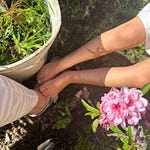
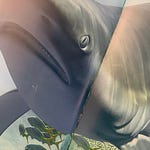

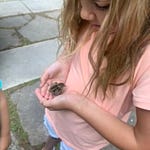
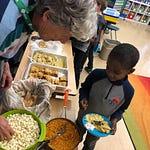
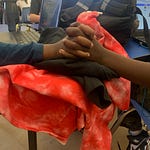
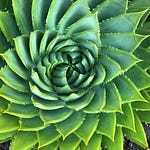
Share this post